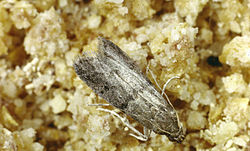| Ephestia | |
|---|---|
 | |
| Cacao moth (E. elutella) | |
| Scientific classification | |
| Kingdom: | Animalia |
| Phylum: | Arthropoda |
| Class: | Insecta |
| Order: | Lepidoptera |
| Family: | Pyralidae |
| Tribe: | Phycitini |
| Genus: | Ephestia Guenée, 1845 [1] |
| Species | |
Several, see text | |
| Synonyms | |
AnagastaHeinrich, 1956 | |

Ephestia is a genus of small moths belonging to the family Pyralidae. Some species are significant pests of dry plant produce, such as seeds and cereals. Best known among these are probably the cacao moth (E. elutella) and the Mediterranean flour moth (E. kuehniella).
The genus Cadra is closely related to Ephestia and might be a junior synonym. Several of these moths are variously assigned to one or the other genus, in particular in non-entomological sources.